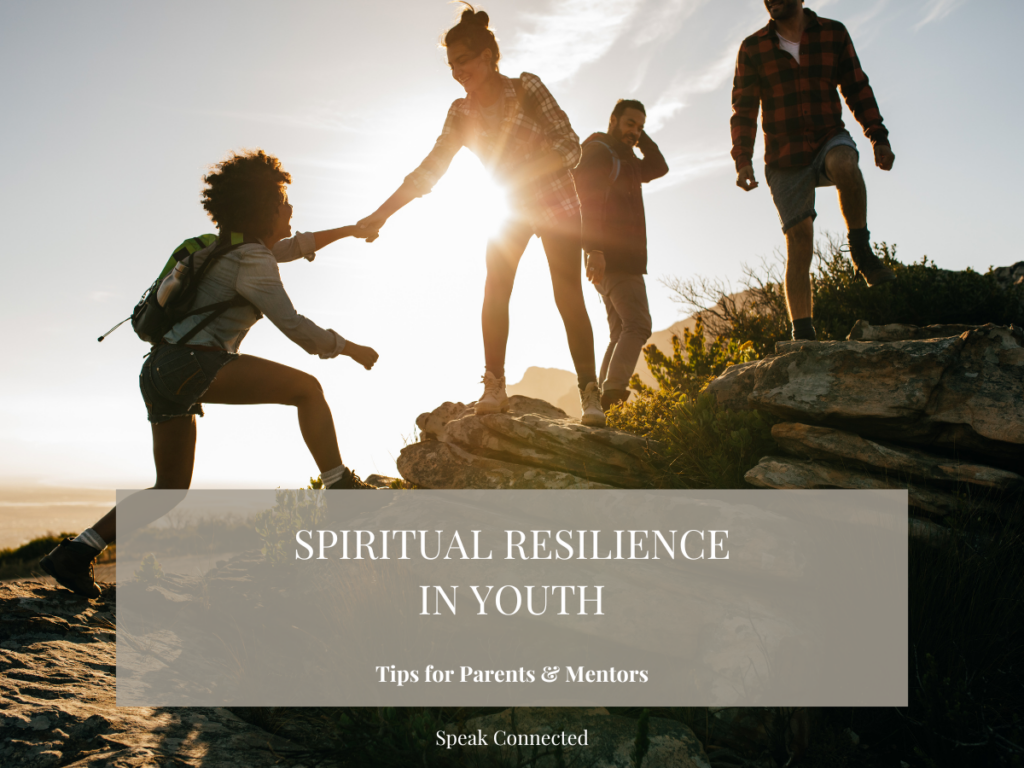
Raising children and teens in an increasingly complex world can feel overwhelming, especially when it comes to addressing their mental health and well-being. Anxiety, depression, and stress often weigh on young minds as they attempt to make sense of the challenges they face. While traditional methods of building resilience are essential, fostering spiritual resilience in youth is an often overlooked tool.
Spiritual resilience empowers young people to find meaning, purpose, and strength despite hardships. Rooted in faith, hope, and a sense of interconnectedness, it is a profound anchor during life’s storms. This blog explores how parents, educators, and mentors can actively cultivate spiritual resilience in children and teens, laying the groundwork for happier, healthier futures.
Read on if you’re searching for ways to nurture the spiritual and emotional well-being of the young individuals in your care.
What is Spiritual Resilience?
Spiritual resilience refers to the inner strength drawn from one’s faith, values, and sense of purpose. For children and teens, this might mean holding on to hope during a challenging exam, praying in moments of fear, or leaning on a trusted spiritual community when feeling isolated.
While all resilience involves a degree of mental and emotional fortitude, spiritual resilience focuses explicitly on finding peace and deeper meaning amid struggles, often through faith-based practices or spiritual exploration.
It is important to remember that spiritual resilience is not confined to one religion or practice. Whether through Christianity, mindfulness, or a broader search for purpose, providing young people with tools to build this resilience helps them stay grounded and grow stronger when life challenges their sense of hope.
Understanding Spiritual Resilience in Youth
When discussing spiritual resilience in youth, we highlight a unique ability to connect life’s challenges with larger questions of meaning, hope, and love. These elements help young people develop the following abilities:
- Confront Hardships with Faith: Instead of feeling defeated, spiritually resilient youth see challenges as opportunities to deepen their trust in God or their higher values.
- Strengthen Emotional Coping: Through prayer, meditation, or reflection, they calm their minds and steady their emotions.
- Develop a Sense of Belonging: Spirituality often fosters connection—whether through a church, support group, or acts of service, young people feel part of something greater than themselves.
For young Christians, practicing faith through scripture and prayer plays a central role in this resilience. However, the core lesson is universal—we grow stronger when we align our hearts with a guiding light beyond transient struggles.
Factors Affecting Spiritual Resilience in Youth
1. Family and Community Support
Families and close-knit communities lay the foundation for spiritual resilience in youth. Parents and caregivers who model trust in God during tough times teach children invaluable lessons about faith and perseverance. Likewise, being part of a supportive church or community group helps young people see firsthand the beauty of shared faith and love.
2. Personal Beliefs and Practices
Every child and teen navigate their own spiritual path. Some may actively nurture a personal relationship with God, while others may explore spirituality through reflection or creativity. Helping young people develop meaningful practices, like reading scripture or journaling their thoughts, strengthens their personal faith toolkit.
3. Coping Strategies and Problem-Solving Skills
Resilience grows when children and teens discover healthy ways to deal with stress. Spirituality offers coping strategies such as daily prayer, surrendering fears to God, or finding wisdom in scripture. By learning to connect their struggles to a greater purpose, youth can approach problems with both pragmatism and grace.
Practical Tips for Fostering Spiritual Resilience
Building spiritual resilience in children doesn’t happen overnight—it requires patience, intention, and a combination of approaches. Here are practical ways parents, teachers, and mentors can nurture this vital skill in young lives.
1. Encourage Open Communication
Create a safe space where children and teens feel comfortable discussing their thoughts and feelings about spirituality and mental health. Be open to their questions—whether they’re wrestling with faith, loss, or self-doubt—and guide them gently toward hope and understanding rooted in love.
2. Promote Positive Role Models
Surround youth with mentors who exemplify spiritual resilience. This could be faith leaders, teachers, or family friends who show kindness, perseverance, and unwavering trust in God despite adversity. By observing role models who live out their faith, young people find inspiration for their own journeys.
3. Get Them Involved in Community and Service Activities
God calls us to love and serve others. Encourage children and teens to participate in service acts within their communities. Whether volunteering at a shelter or helping with local church projects, these experiences teach empathy, gratitude, and the joy of selflessness.
4. Teach Mindfulness and Relaxation Techniques
Practices like intentional breathing, quiet prayer, or reflection are powerful tools for coping with stress. Consider introducing mindfulness practices alongside faith-based traditions to help children and teens center themselves and seek peace.
5. Share the Power of Scripture and Worship
The Word of God can be a beacon of hope during difficult times. Share uplifting scripture like Philippians 4:13 (“I can do all this through him who gives me strength”) and encourage young people to attend worship services where they can draw comfort from a sense of unity and praise.
Stories of Spiritual Resilience in Action
Practical examples often offer the most hope. Here are testimonials from parents and advocates demonstrating how spiritual resilience makes a meaningful difference in young lives:
- Sara, a mother of two teenagers: “When my daughter struggled with anxiety, our nightly scripture readings brought her peace. We started journaling together about how faith shaped her day, and over time, she found courage in her challenges.”
- Tim, a mentor: “One of my students overcame the loss of a loved one by joining a church choir. Music became her source of healing and connection to God.”
- Anna, a teacher: “I encourage moments of prayer before tough exams. Over time, I’ve seen my students handle stress with greater composure and grit.”
These stories remind us that spiritual resilience often transforms young hearts in the most beautiful ways.
Resources to Support Your Efforts
If you’re looking to deepen your understanding and gather tools to foster spiritual resilience in youth, here are some great resources to explore:
- Books
- “Grace-Based Parenting” by Dr. Tim Kimmel
- “Raising Resilient Kids” by DR. Reham Sadek
- Websites
- Focus on the Family: Insightful articles and faith-based tips for parents.
- Youth Mental Health First Aid: Mental health resources tailored to young people.
Empowering the Next Generation Through Faith
Raising spiritually resilient children is one of the greatest gifts you can give. Walking alongside them with compassion, faith, and encouragement, you help them develop the tools they need to thrive.
Take small steps today—open dialogue, share a teaching moment or connect with a faith-based mentor. Together, we can foster a generation of young people who shine brightly even in life’s darkest moments.
If this guide resonated with you, share it with fellow parents, educators, or mentors who can benefit from these insights. Let’s support one another in building a faithful, resilient future.
Recommended Readings
Finding Strength and Purpose: A Guide to Devotionals for Teens
Teen Center: Strengthening Your Faith and Navigating Life’s Challenges
How to Find Spiritual Peace: Finding Peace in God’s Presence






